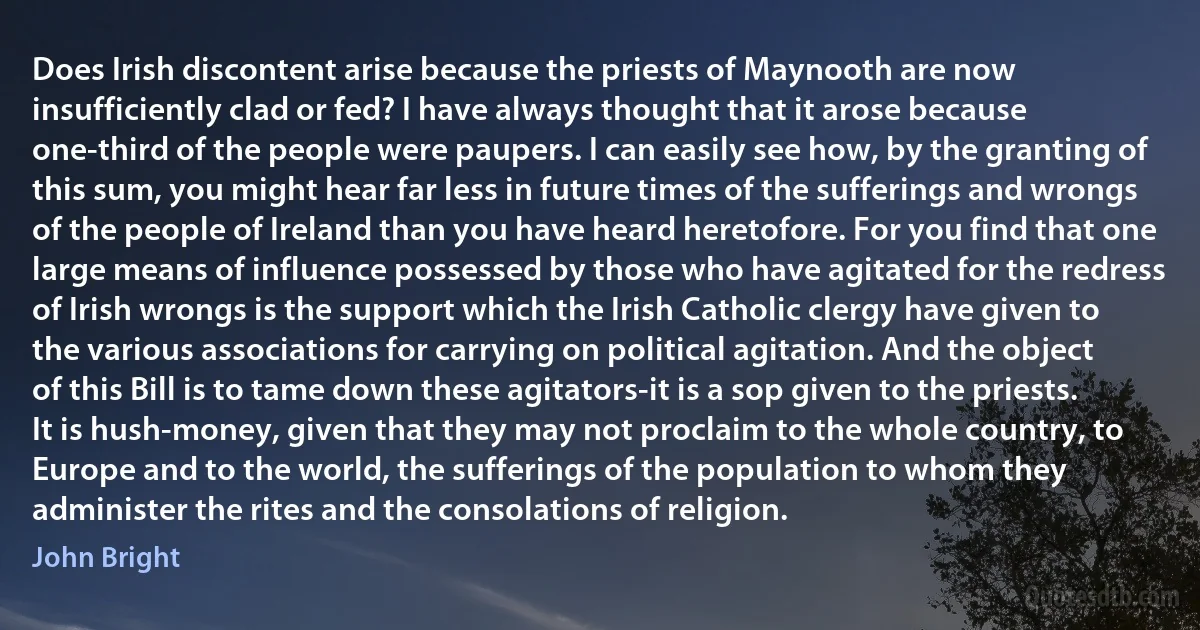
Does Irish discontent arise because the priests of Maynooth are now insufficiently clad or fed? I have always thought that it arose because one-third of the people were paupers. I can easily see how, by the granting of this sum, you might hear far less in future times of the sufferings and wrongs of the people of Ireland than you have heard heretofore. For you find that one large means of influence possessed by those who have agitated for the redress of Irish wrongs is the support which the Irish Catholic clergy have given to the various associations for carrying on political agitation. And the object of this Bill is to tame down these agitators-it is a sop given to the priests. It is hush-money, given that they may not proclaim to the whole country, to Europe and to the world, the sufferings of the population to whom they administer the rites and the consolations of religion.
John BrightRelated topics
carrying country far fed find future given granting large less might now people redress religion see support thought times world means one-thirdRelated quotes
We must call attention, among the workers parties or the extremist tendencies within those parties, to the need to undertake an effective ideological action in order to combat the emotional influence of advanced capitalist methods of propaganda. On every occasion, by every hyper-political means, we must publicize desirable alternatives to the spectacle of the capitalist way of life, so as to destroy the bourgeois idea of happiness. At the same time, taking into account the existence, within the various ruling classes, of elements that have always tended (out of boredom and thirst for novelty) toward things that lead to the disappearance of their societies, we should incite the persons who control some of the vast resources that we lack to provide us with the means to carry out our experiments, out of the same motives of potential profit as they do with scientific research.

Guy Debord
Rarely has the incapacity of governments to hold up the course of history been more conclusively demonstrated than in the generation after 1815. To prevent a second French Revolution, or the even worse catastrophe of a general European revolution on the French model, was the supreme object of all the powers which had just spent more than twenty years in defeating the first; even of the British, who were not in sympathy with the reactionary absolutism which re-established themselves all over Europe and knew quite well that reforms neither could nor ought to be avoided, but who feared a new Franco-Jacobin expansion more than any other international contingency. And yet, never in European history and rarely anywhere else has revolutionarism been so endemic, so general, so likely to spread by spontaneous contagion as well as by deliberate propaganda.

Eric Hobsbawm
If Christ were to walk in this world today, do you know what would happen to Him? He would be placed in a mental institution and given psycho-therapy, just as would His Saints. The world would crucify Him today just as it did 2000 years ago, for the world has not learned a thing, except more devious forms of hypocrisy. And what would happen if, in one of my classes at the university, I would one day tell my students that all the learning of this world is of no importance beside the duty of worshipping God, accepting the God-man who died for our sins, and preparing for the life of the world to come? They would probably laugh at me, and the university officials, if they found out, would fire me-for it is against the law to preach the Truth in our universities. We say that we live in a Christian society, but we do not: we live in a society.

Seraphim Rose
Just as the various trades are most highly developed in large cities, in the same way food at the palace is prepared in a far superior manner. In small towns the same man makes couches, doors, plows and tables, and often he even builds houses, and still he is thankful if only he can find enough work to support himself. And it is impossible for a man of many trades to do all of them well. In large cities, however, because many make demands on each trade, one alone is enough to support a man, and often less than one: for instance one man makes shoes for men, another for women, there are places even where one man earns a living just by mending shoes, another by cutting them out, another just by sewing the uppers together, while there is another who performs none of these operations but assembles the parts, Of necessity, he who pursues a very specialised task will do it best.

Xenophon
The city is very different from the country, girl. It is a kind of shared consciousness that begins its work on you as soon as you enter it, if not well before, a consciousness that begins to separate you from the country possibly even before you decide to journey toward it. It encircles you with forces much greater than the walls and gates which imitate tinier villages or towns. People who come to it come seeking the future, not realizing all that will finally affect them in it is their own, only more or less aware, involvement with the past. The way we do things here-really, that's all there is to be learned in our precincts. But in the paving of every wide, clear avenue, in the turnings of every dark, overhung alley, in the ornaments on every cornice, in the salt-stained stones of each neighborhood cistern, there are traces of the way things once were done-which is the key to why they are done as they are today.

Samuel R. Delany
